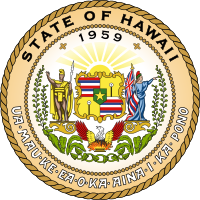HAWAIʻI CIVIL RIGHTS COMMISSION
WILLIAM D. HOSHIJO
EXECUTIVE DIRECTOR
DISABILITY COMMUNICATION ACCESS BOARD
FRANCINE WAI
EXECUTIVE DIRECTOR
FOR IMMEDIATE RELEASE
July 17, 2018
STATE CIVIL RIGHTS COMMISSION
AND DISABILITY COMMUNICATION ACCESS BOARD CAUTION:
New Service Animal Law Does Not Diminish Rights of Persons with Disabilities
Under State and Federal Fair Housing Law
HONOLULU – The Hawaiʻi Civil Rights Commission (HCRC) and the Disability Communication Access Board (DCAB) are joining in a public education effort to caution against a misreading of a newly enacted law to the detriment of the rights of persons with disabilities under state and federal fair housing laws.
On July 10, 2018, S.B. No. 2461 became law without Governor Ige’s signature. The newly enacted Act 217 establishes a civil penalty for “fraudulently representing a dog as a service animal.”
Neither the HCRC nor DCAB will have enforcement jurisdiction over this new law, but both want to avoid confusion that it could cause, conflicting with state and federal laws that protect persons with disabilities.
“The bill is meant to discourage persons, including persons with a disability, from representing their animals as ‘service animals’ in order to request access when animals or pets are otherwise prohibited,” said HCRC Executive Director William Hoshijo. “However, under both state and federal fair housing laws, a person with a disability has the right to request a reasonable accommodation that is not limited to the use of a service animal, but may more broadly request the use of an assistance animal that works, assists, provides emotional support, or performs tasks for a person with disability.’
“The use of an assistance animal as reasonable accommodation in housing is not governed by the Americans with Disabilities Act (ADA), nor is it affected by this new law.”
DCAB Executive Director Francine Wai explained the distinction between service animals and assistance animals:
“The Americans with Disabilities Act (ADA) governs access to government services and public accommodations and permits people to bring service animals into locations where pets are not permitted. For the purposes of the ADA, the US Department of Justice has defined “service animals” as dogs (and miniature horses) that are individually trained to do work or perform tasks for persons with disabilities. The ADA definition of service animals expressly excludes comfort or support animals that are not trained to perform tasks.
“Under the ADA, when an individual with a service animal comes to a government office or a business with a service animal, if the individual’s disability and the service the animal provides is not obvious, only two limited inquiries are allowed by law: 1) whether the dog is a service animal required because of a disability; and, 2) what work or task the dog has been trained to perform. Pursuant to U.S. Department of Justice guidance, no other inquiry or request for documentation or proof is allowed.
“However, housing law is different. The Federal Fair Housing Act (FHA) and equivalent state law is broader. Those laws provide for accommodations for “assistance animals” which are animals that work, assist, provide emotional support, or perform tasks for a person with a disability. Assistance animals include service animals, but can also include support animals, therapy animals, and comfort animals. A certain level of documentation may be appropriate in housing situations.
Hoshijo and Wai both expressed concern that although the new civil penalty will not directly affect rights and obligations under state and federal fair housing laws, it could cause confusion and chill the exercise of rights under those laws.
State law should not encourage unlawful inquiries of persons who attempt to access government offices or businesses accompanied by a service animal, as is their right under the ADA, whether those inquiries are made by staff, agents, or third party proxies. Neither should this law inhibit or restrict people with disabilities from seeking an accommodation in a housing context with an assistance animal.
The Hawaiʻi Civil Rights Commission is responsible for enforcing, and will enforce, state civil rights laws that prohibit discrimination in employment, housing, public accommodations, and state-funded services. The Disability and Communication Access Board is a statewide Board whose mission is to advocate and promote the full integration, independence, equal access, and quality of life for persons with disabilities in society.
If you feel you have been subjected to discrimination because of your race, ancestry, disability, sexual orientation, religion, sex, including gender identity, or other prohibited bases, contact the HCRC at: telephone (808) 586-8636, or email [email protected]. For more information, go to the HCRC webpage at: https://labor.hawaii.gov/hcrc/.
To learn more about legislation, rules, policies, procedures, and plans relating to persons with disabilities and their civil rights or service needs, contact DCAB at: telephone (808) 586-8121, or email [email protected]. For more information, go to the DCAB webpage at: https://health.hawaii.gov/dcab/.
Equal Opportunity Employer/Program
Auxiliary aids and services are available upon request to individuals with disabilities.
TDD/TTY Dial 711 then ask for (808) 586-8866.
Media Contacts:
William D. Hoshijo
Executive Director
Hawaiʻi Civil Rights Commission
(808) 586-8636
[email protected]
Francine Wai
Executive Director
Disability and Communication Access Board
(808) 586-8121
[email protected]
Bill Kunstman
Department of Labor and Industrial Relations
Director’s Office830 Punchbowl Street #321
Honolulu HI 96813
[email protected]
Office: (808) 586-8845
Fax: (808) 586-9099
TDD/TTY Dial 711 then ask for (808) 586-8866


